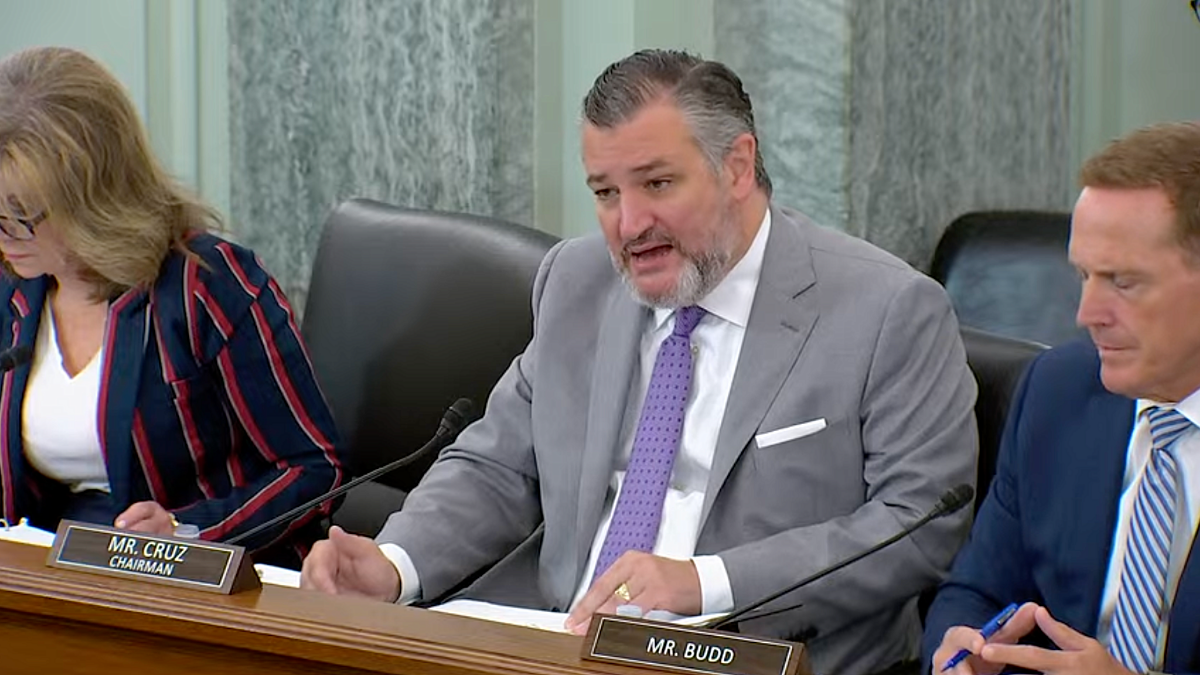AI Insights
Can Israel create the right regulatory framework for AI in medicine? – The Jerusalem Post
Can Israel create the right regulatory framework for AI in medicine? The Jerusalem Post
Source link
AI Insights
US Senator Ted Cruz Proposes SANDBOX Act to Waive Federal Regulations for AI Developers

US Senator Ted Cruz (R-TX), chairman of the Senate Commerce Committee, at a hearing titled “AI’ve Got a Plan: America’s AI Action Plan” on Wednesday, September 10, 2025.
On Wednesday, United States Senator Ted Cruz (R-TX) unveiled the “Strengthening Artificial intelligence Normalization and Diffusion By Oversight and eXperimentation Act,” or the SANDBOX Act. The 41-page bill would direct the director of the White House Office of Science and Technology Policy (OSTP) to establish a federal “regulatory sandbox” for AI developers to apply for waivers or modifications on compliance with federal regulations in order to test, experiment with, or temporarily offer AI products and services.
In a statement, Cruz said the legislation is consistent with the goals of the Trump administration’s AI Action Plan, which was released in July, and is the first step toward a “new AI framework” that can “turbocharge economic activity, cut through bureaucratic red tape, and empower American AI developers while protecting human flourishing.”
The bill would create a mechanism for companies to apply to the OSTP director for a waiver or modification to rules or regulations under any federal agency “that has jurisdiction over the enforcement or implementation of a covered provision for which an applicant is seeking a waiver or modification” under the sandbox program. Waivers or modifications would be granted for a two-year period, with four potential renewals totaling up to a decade.
Applicants under the program must demonstrate that “how potential benefits of the product or service or development method outweigh the risks, taking into account any mitigation measures,” including descriptions of “foreseeable risks” such as “health and safety,” “economic damage,” and “unfair or deceptive trade practices.” Applicants that receive a waiver are not immune to civil or criminal liability that may result from the deployment of their AI product or service. The bill requires mandatory incident reporting under a public disclosure mechanism.
Federal agencies are given 90 days to review applications. If an agency does not submit a decision or seek an extension by the deadline, the OSTP director is permitted to presume that the agency does not object. If an application is denied, it can be appealed.
The bill also includes a provision for Congressional review of rules and regulations that “should be amended or repealed as a result of persons being able to operate safely without those covered provisions” under the sandbox program. The OSTP director is tapped to identify any such provisions in a “special message” to Congress submitted each year.
The bill also contemplates coordination with “State programs that are similar or comparable to the Program,” including to “accept joint applications for projects benefitting from both Federal and State regulatory relief” and to harmonize other aspects of the program.
The Senate Commerce Committee’s announcement said the bill is backed by groups including the Abundance Institute, the US Chamber of Commerce, and the Information Technology Council (ITI). Public Citizen, a watchdog group, said in a statement that the bill puts public safety on the “chopping block” in favor of “corporate immunity.”
The announcement of the bill was timed alongside a Senate Commerce hearing titled “AI’ve Got a Plan: America’s AI Action Plan,” which featured testimony from OSTP director Michael Kratsios. During the hearing, Cruz laid out a legislative agenda on AI, including reducing the regulatory burden on AI developers. But, he said, AI developers should still face consequences if they create harm.
“A regulatory sandbox is not a free pass,” said Cruz. “People creating or using AI still have to follow the same laws as everyone else. Our laws are adapting to this new technology.”
In response to a question from Cruz, Kratsios said he would support the approach described by the SANDBOX Act.
The new legislation follows a failed effort by Cruz and other Republicans to impose a sweeping moratorium on the enforcement of state laws regulating artificial intelligence. Earlier this year, the House passed the moratorium as part of the so-called “One Big, Beautiful” bill, or HR 1. After efforts by Cruz to move the measure through the Senate by tying it to the allocation of $42 billion in funding for the Broadband Equity and Access Deployment (BEAD) program, the chamber voted 99-1 to strip it out of the budget bill prior to passage. Still, some experts remain concerned that the administration may try to use other federal levers to restrict state AI laws.
AI Insights
AI workers are boosting rents across the US

The newest wave of tech workers isn’t just filling office towers — it’s bidding up apartments in cities already notorious for high housing costs.
Across the US and Canada, the number of workers with artificial intelligence skills has surged by more than 50% in the past year, topping 517,000, according to CBRE.
Much of that growth is clustered in the San Francisco Bay Area, New York City, Seattle, Toronto and the District of Columbia — areas where rents were straining households even before the AI boom.
The result: a fresh wave of demand that has helped push Manhattan rents up more than 14% between 2021 and 2024, Washington more than 12% in that same span, Seattle more than 7% and San Francisco nearly 6%.
New York gained about 20,000 AI-skilled workers over the past year alone, while other hubs including Atlanta, Chicago, Dallas-Fort Worth, Toronto and Washington each logged increases of 75% or more.
High salaries in AI allow workers to shoulder those rents — CBRE found Manhattan’s AI professionals spend about 29% of their income on housing, while in San Francisco and DC the share drops closer to 19%.
That affordability for one group is adding to the squeeze on everyone else.
Colin Yasukochi, executive director of CBRE’s Tech Insights Center, said San Francisco illustrates the trend.
“With this AI revolution, it’s been a fundamental game changer for the city of San Francisco, because that’s really ground zero for the AI revolution and where most of these major high-profile firms like OpenAI are located,” he told CNBC.
Unlike other parts of the tech sector that turned to remote work, AI firms are filling office towers. In San Francisco, 1 out of every 4 square feet leased over the past two and a half years went to an AI tenant.
“AI is predominantly in-office work, and they’re sort of back to the earlier days of tech innovation, where they’re in the office five, six days a week and for long hours,” Yasukochi said.
AI Insights
AI chatbot users report mental health issues

More and more people are reporting that artificial intelligence chatbots like ChatGPT are triggering mental health issues, such as delusional thinking, psychotic episodes and even suicide.
O. Rose Broderick, who covers disability at STAT, spoke to doctors and researchers who are racing to understand this phenomenon.
This segment airs on September 10, 2025. Audio will be available after the broadcast.
-

 Business2 weeks ago
Business2 weeks agoThe Guardian view on Trump and the Fed: independence is no substitute for accountability | Editorial
-
Tools & Platforms4 weeks ago
Building Trust in Military AI Starts with Opening the Black Box – War on the Rocks
-

 Ethics & Policy1 month ago
Ethics & Policy1 month agoSDAIA Supports Saudi Arabia’s Leadership in Shaping Global AI Ethics, Policy, and Research – وكالة الأنباء السعودية
-

 Events & Conferences4 months ago
Events & Conferences4 months agoJourney to 1000 models: Scaling Instagram’s recommendation system
-

 Jobs & Careers2 months ago
Jobs & Careers2 months agoMumbai-based Perplexity Alternative Has 60k+ Users Without Funding
-

 Podcasts & Talks2 months ago
Podcasts & Talks2 months agoHappy 4th of July! 🎆 Made with Veo 3 in Gemini
-

 Education2 months ago
Education2 months agoMacron says UK and France have duty to tackle illegal migration ‘with humanity, solidarity and firmness’ – UK politics live | Politics
-

 Education2 months ago
Education2 months agoVEX Robotics launches AI-powered classroom robotics system
-

 Funding & Business2 months ago
Funding & Business2 months agoKayak and Expedia race to build AI travel agents that turn social posts into itineraries
-

 Podcasts & Talks2 months ago
Podcasts & Talks2 months agoOpenAI 🤝 @teamganassi





















